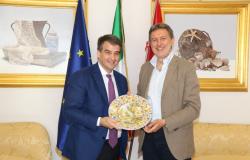The responsibilities for the conditions of Basilicata that we mere mortals know well do not lie solely with politicians. It’s obvious. They are also some Lucanians, obviously. Indeed we will talk about a certain type of Lucanians: the Lucanians. And who are the Lucanians? The entrepreneurs who made their fortune with their hat in hand in front of the doors of the buildings. The half-socks who have made a career without any merit, resorting exclusively to the ability to be mediocre and bootlicking. The exponents of the petty bourgeois white-collar class of gentlemen, who in the public administration have even built a plastic future for their own children and grandchildren, bowing their heads before the petty scams and “reasonable requests” of the politician on duty. Lucanians they are those who agreed to exchange rights for lentils, the vote for a miserable promise. Who does not have an awareness of limits and a sense of humility. Who builds unlikely biographies, parchment curricula and cardboard pedestals. Too much uphanery∗ around.
Walking through social networks, among noticeboards, posters, newspapers and magazines, we discover a Basilicata overpopulated by writers, journalists, poets, statesmen, economists, actors, all certified experts with homemade stripes in every sector of human knowledge. And we ask ourselves why, with such widespread science, with such an abundance of intellectuals, this poor land of ours is in such bad shape. In recent times, especially during the electoral period, we have noticed a “regurgitation of pride” on the part of some so-called journalists and writers, or vice versa, who rush to the Prince’s aid, as has often happened in history from the Unification of Italy onwards . Those who are more astute, and in need of prebends, wear the role of the high-class intellectual and write, with a critical appearance, the praises of the Powerful. Pay attention, they have a grotesque look, perhaps because those clothes reveal a page boy’s style. And they also venture into the clumsy attempt to refute the arguments of those who, few of them, nitpick the Prince.
These pageboys are surrounded by ‘journalists’ and ‘writers’, or vice versa, who after a professional life spent passing the showgirls of Power, stay away from hot topics. Around all this goodness of intelligence, “magazines” are born, pseudo newspapers and magazines, blogs and social pages that try, in exchange for some scraps of the day, to win over the Prince. All aspiring courtiers of a court already crowded with women and men who, due to their noble and wise mediocrity, frequent, or aspire to frequent, the Prince’s rooms and participate in the banquets. But be careful: the Princes, or aspiring Princes, are everywhere on the right, left, above and below, while it is not clear what happened to the Princes. Basilicata, meanwhile, continues to wallow in its miseries.
*The word comes from the Spanish ufano, proud, ufaneria would therefore mean pride. In reality it also means vain, but that’s not enough. The term has taken on a semantic extension relevant to the meaning of the article. Excessive self-esteem of those who believe they know everything and can do everything. High self-esteem. Display of non-existent merits and excessive consideration of appearances. The term is also in some Lucanian dialects. The meaning ranges from exaggerated to one who talks nonsense to make himself look great “that is ufanarë.” Appearance thing.
©All rights reserved
Readaptation of an article already published in January 2018 and signed by the same author





